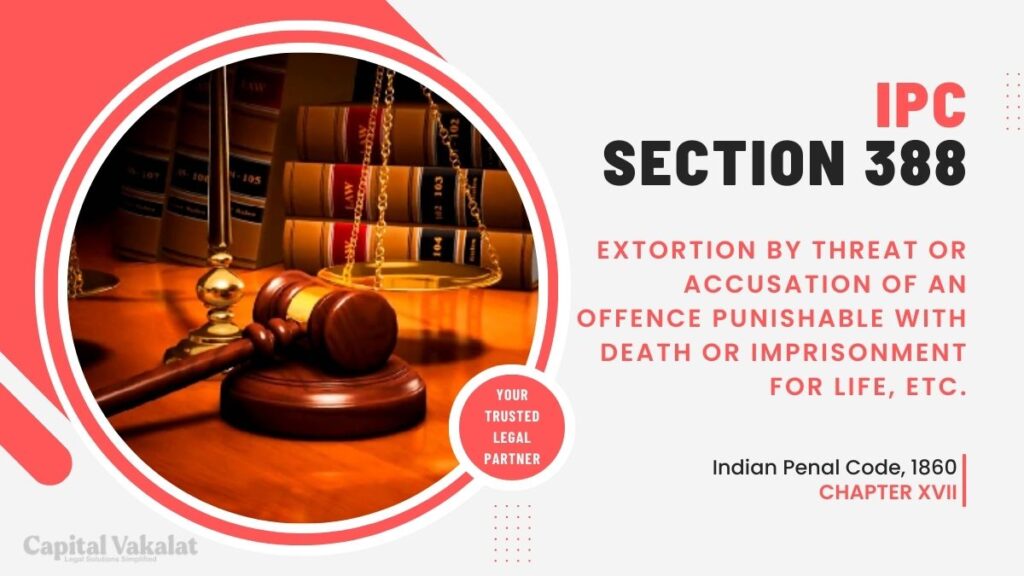In the intricate tapestry of Indian Penal Code (IPC), Section 388 holds a distinctive place, addressing the gravity of extortion by threat or accusation of an offence punishable with death or imprisonment for life.

As we embark on this journey to understand the nuances of Section 388 IPC, we will explore its definition, historical evolution, landmark cases, challenges, and its global standing.
Introduction to Section 388 IPC
Section 388 IPC is a legal provision that specifically deals with extortion cases where the threat or accusation involves an offence that attracts severe penalties, such as death or life imprisonment. This section plays a pivotal role in upholding justice and ensuring that those who resort to coercion for personal gain face legal consequences.
Understanding Extortion in Section 388 IPC
To comprehend the implications of Section 388, one must delve into the elements that constitute extortion. Unlike other offences, extortion involves a unique set of circumstances and actions. We will dissect these elements, drawing distinctions to establish a clear understanding of the legal implications.
Offences Punishable with Death or Imprisonment for Life
The ambit of Section 388 IPC extends to a spectrum of offences, each carrying the weight of severe penalties. From crimes against the state to heinous acts against individuals, this section covers a broad array of illegal activities. We will explore the specific offences encapsulated and the profound legal repercussions they entail.
Threats and Accusations in Extortion Cases
In the realm of extortion, the nature of threats and accusations becomes a critical focal point. Unpacking the intricacies of these elements sheds light on the severity of the offence. Moreover, false accusations can lead to dire consequences, both for the accused and the legal system itself. We will navigate through the various dimensions of threats and accusations in extortion cases.
Historical Context of Section 388 IPC
Understanding the genesis and evolution of Section 388 IPC adds depth to its interpretation. We will embark on a historical journey, exploring the milestones, amendments, and the societal context that influenced the creation of this crucial legal provision.
Landmark Cases and Precedents
The application of Section 388 IPC comes to life through landmark legal decisions. Analyzing these cases not only provides insights into the interpretation of the law but also sets precedents for future litigation. We will examine notable cases, dissecting their impact on jurisprudence and the legal landscape.
Challenges and Criticisms
No legal provision is without its share of challenges and criticisms. Section 388 IPC is no exception. We will delve into potential issues of misuse, debates surrounding reforms, and the delicate balance required to prevent abuse while preserving the essence of the law.
Role of Law Enforcement
For Section 388 IPC to be effective, the role of law enforcement is paramount. Investigative procedures, collaboration with legal authorities, and the challenges faced by law enforcement agencies in handling extortion cases will be explored in this section.
Global Perspectives on Extortion Laws
Comparing Section 388 IPC with extortion laws in other jurisdictions provides a holistic view. We will undertake a comparative analysis, drawing lessons and insights from global practices to assess the effectiveness and relevance of the Indian legal framework.
Conclusion
In conclusion, Section 388 IPC stands as a formidable guardian against extortion by threat or accusation of heinous crimes. Through its evolution, application in landmark cases, and adaptation to societal changes, this legal provision has become a cornerstone in the fight against coercion. As we navigate the complexities of this section, it becomes evident that its significance reverberates beyond legal frameworks, influencing the very fabric of justice in society.
Frequently Asked Questions
How does the historical context of Section 388 IPC influence its interpretation?
The historical context provides insights into the societal needs and influences that led to the creation of this section, shaping its interpretation over time.
What measures exist to prevent the misuse of Section 388 IPC?
The legal system has safeguards and checks in place to prevent the misuse of Section 388 IPC, but challenges and debates persist.
Can false accusations in extortion cases lead to legal consequences for the accuser?
Yes, false accusations in extortion cases can lead to legal consequences for the accuser, emphasizing the importance of truthfulness in legal proceedings.
How does Section 388 IPC align with global perspectives on extortion laws?
Section 388 IPC will be compared with extortion laws in other jurisdictions to understand its standing in the global legal landscape.